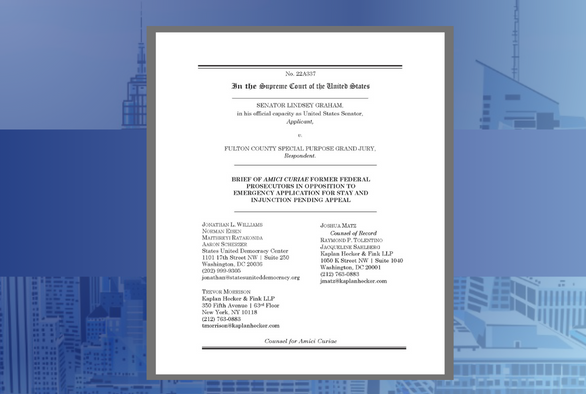On October 27, Kaplan Hecker & Fink attorneys – along with States United Democracy Center – filed an amicus brief in the U.S. Supreme Court opposing an emergency application filed by U.S. Senator Lindsey Graham. Senator Graham asked the Court to stay an order requiring him to comply with a special grand jury subpoena issued as part of an investigation in Fulton County, Georgia into interference with the 2020 presidential election. Our amicus brief—filed on behalf of former federal prosecutors—explains why Senator Graham’s arguments (including his claims under the Speech or Debate Clause) lack merit. The case is Lindsey Graham v. Fulton County Special Purpose Grand Jury, No. 22-337.
As we explain in the amicus brief:
“The Speech or Debate Clause immunizes Senator Graham from testimony only as to his legislative acts. Here, the grand jury subpoena seeks testimony concerning several topics, the majority of which involve non-legislative conduct as defined by [the] Court’s precedents. There is no constitutional bar to obtaining such testimony, and there is no merit to Senator Graham’s assertion that questioning on such topics would serve only as a pretext to ask otherwise forbidden questions about his motives for legislative acts. With respect to Senator Graham’s calls to state officials, the district court and Eleventh Circuit drew sensible lines to fully protect legislative privilege: Senator Graham cannot be asked about truly legislative conduct (such as gathering information to inform a future vote), but he may be asked precise questions to see if he engaged in the non-legislative conduct described by several participants on those calls (namely, cajoling officials to not count certain ballots or to prospectively modify Georgia’s ballot counting procedures). These lines are firmly supported by precedent, and strike a reasoned balance between the Senator’s immunities and the principle that grand juries may seek “every man’s evidence.” See Trump v. Vance, 140 S. Ct. 2412, 2420 (2020). Senator Graham’s objections to this approach misstate the facts and the law, and do not justify the extraordinary relief he seeks.”
The brief also explains that there is no circuit split, as Senator Graham claims, regarding the methodology for analyzing claims of legislative privilege or who bears the burden of proof in such cases. We argue that there is no reasonable probability that the Court will grant review given the weakness of Senator Graham’s arguments, whereas a stay would undermine vital public interests in criminal law enforcement and ensuring the integrity of our elections.
The Kaplan Hecker team includes partners Joshua Matz and Ray Tolentino, of counsel Trevor Morrison, and associate Jacqueline Sahlberg.
Read the full brief here, and read related news coverage here and here.
